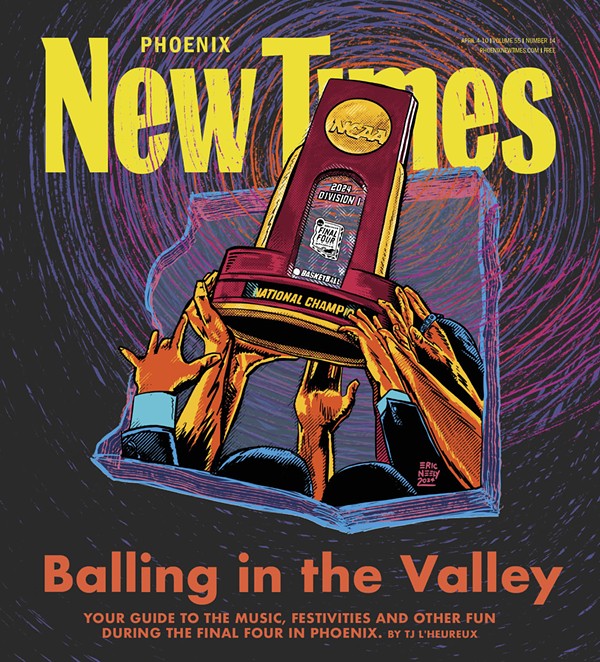Dr. Mark Salerno steps to a podium, gripping a tattered black shoe.
It is a crisp and bright early December morning in Peoria, on 99th Avenue south of Grand Avenue. About 40 people are seated under a tent at the rear of a psychiatric crisis center operated by the nonprofit Recovery Innovations of Arizona.
Today is ribbon-cutting day at the newly rebuilt clinic, which serves as a quasi-emergency room for the mentally troubled. It's called The Living Room, and just about anyone who walks in can get crisis services for up to three days. (What happens after that depends on several variables.)
Salerno is manager of The Peoria Recovery Response Center (a.k.a. The Living Room), a warm, welcoming spot that focuses on providing peer support from people with similar life experiences — mental issues and substance abuse among them.
The shoe, Salerno says, symbolizes important things in both his own life and those he serves.
Recovery Innovations hired him in 2004. It was a bit of a risk. Back then, he was a man in his late 40s who had recently suffered a major mental breakdown, landing him in jail and costing him his previously good name.
In early 2002, Mark Salerno was a popular pediatrician with a flourishing solo practice in North Phoenix and a fine home in Carefree. Then, seemingly out of nowhere, Salerno was indicted for stealing the car of someone he knew.
Soon after that, in an episode that nearly cost him his life, the doctor faked his own kidnapping and fled Arizona. Authorities rescued him from the trunk of his car (he had put himself in there) in San Diego three days later.
Later in 2002 came another flight, 16 days on the run shortly after being placed on probation for the bizarre stolen-car caper. That one ended in the backwoods of Pennsylvania, after Maricopa County Sheriff Joe Arpaio sternly told reporters that his agency would continue to search for Salerno "whether he is crazy or not."
Mean-spirited or just tactless, the sheriff was right about one thing: Dr. Salerno was not in his right mind during those dark times.
Yet here Salerno is, almost a decade later, nattily attired in a bright red vest and colorful striped tie, warming up this ribbon-cutting gathering with rim-shot one-liners and tales of hope and recovery in his unabashed New Jersey accent — gesturing with that funky black shoe.
The doctor first noticed the shoe on the roof over the building's entrance years earlier; it stayed put through brutal summers and chilly winters.
"It stands for the journey we've taken together," Salerno says, referring to Recovery Innovation's clients (the clinic calls them "guests"). "It represents the journey it took to get us here to this place, physically and figuratively."
One day during the recent construction, a worker happened to kick the shoe off the roof just as Salerno was standing there.
The doctor claimed it for his own.
"It's had a life, for sure," he says of the shoe.
So has Dr. Salerno.
Peoria police Lieutenant Rich Scrivens shakes the doctor's hand warmly after the presentation, as does Phoenix police officer Nick Margiotta, who heads his agency's Crisis Intervention Training Program (CIT).
"Mark has been there and back," Officer Margiotta says later. "He knows what it's like to be in trouble and not being able to think straight. And he knows it's possible to survive to see a better day."
Mark Salerno wasn't keen about telling his story for public consumption.
"I'm way past wanting to be asked, 'Aren't you the guy who staged his own kidnapping? Aren't you the guy who pissed off Joe Arpaio?'" he says. "That's not a legacy I'm interested in."
But the doctor warmed to the task, describing how he slipped into the abyss yet somehow found his way out of the darkness. He is an example of how mental illness doesn't have to be a lifelong jacket, and how someone can raise from the depths of despair and depression.
"An ounce of hope would have helped me back then," Salerno says. "I had no one tell me that eventually you can get through this and have a life, and you may have a better life than you ever imagined — a better personal life, better spiritual side, great meaning in your new work. It's not easy, but it can and does happen. I see it every day."
New Times first met Salerno, quite by chance, at a meeting of members of the local mental-health community and police.
That Valley mental-health counselors, cops, and even bureaucrats meet regularly these days to discuss their collective problems is a relatively new concept — and a necessary one.
These people labor in the state of Arizona, where policymakers endorse a grossly underfunded mental-health system, and where emergency rooms, homeless shelters and jails long have been the usual entry points for the deeply troubled — not crisis centers such as The Living Room.
"It used to be that we, as cops, used to automatically take people to jail or maybe do the old 'dump and run' at a psych unit someplace to get folks off our hands," Officer Margiotta says.
"The cost to everyone has been enormous. With the way budgets for mental health have been cut in Arizona, we have had to figure out ways to make things work as well as possible. Working with people like Mark and others is one big way."
Salerno's positive place in that ongoing dialogue is remarkable.
Just 10 years ago, Maricopa County sheriff's officials deemed him a high risk for suicide and strapped him for hours into a "restraint chair" at the Madison Street Jail.
Known by critics as the "Devil's chair," its leather belts and tight cuffs keep a prisoner from moving.
It is the same medieval device in which inmate Scott Norberg suffocated in June 1996. (Norberg's family later settled a civil lawsuit with the Maricopa County Sheriff's Office for a reported $8.25 million.)
By the end of 2002, Salerno's life seemed ruined, if not over.
In his case, substance abuse never was an issue, nor was an urge to hurt anyone physically, other than (at times) himself.
Instead, Salerno suffered from a mental condition that caused him to lose touch with reality and endure ongoing mood problems.
Later, he wrote a short story that aptly described his state of mind after his major psychotic break.
Salerno called it "Not Today Luke."
Luke was his adored (now deceased) golden Labrador retriever. The piece was written from Luke's canine perspective, as his nearly catatonic master huddled in bed day after day, depressed beyond measure.
"Mark had been in bed for a long time now. I have howled at five full moons since we last took a hike. I remembered our trips to the mountain. We were both so fit and happy and moved gracefully and confidently over rough terrain. It was clear to everyone we passed that we felt I was the greatest dog and I knew he was the best master.
"I remember the day he took to bed. He must have come home from the hospital; he had a scent similar to the vet's office. He moved slowly and clumsily. He gave me a little pat on my head, but without the enthusiasm I had grown accustomed to. His voice was thick and slow and his 'Hi Luke' came out on a sigh and seemingly with great effort."
Luke tells the reader that he won't stop fetching his leash from the wicker basket every morning.
"I will continue to say, 'C'mon, Mark, let's go!' even though I cannot speak," the dog says. "I am the keeper of hope."
Another Luke, of Biblical fame, is the patron saint of doctors.
Mark Salerno grew up in a working-class home in Bergen County, New Jersey, the younger of two boys. His mother's parents lived upstairs in the two-family residence.
Salerno's father was a service manager for a firm that repaired elevators and forklifts. His mother was a homemaker.
"My parents were community people," he says, "and doing things for others was what they did. I knew from the youngest age that I had to do something, preferably for those less fortunate than me."
After high school, Salerno enrolled at a private Dominican college about 17 miles from New York City. He was able to pay for his schooling by carving out a job as a "housemaster" at the New York Institute for the Blind in the Bronx, where he spent his nights after attending college classes during the day.
The venerable institute included students who were blind and deaf, victims of a rubella epidemic in the mid-1960s. Salerno learned American Sign Language so he could communicate with the deaf kids.
He earned his undergraduate degree in education and seemed headed for a teaching career after completing his master's degree in special and elementary education at Boston College.
But in 1985, Salerno was accepted to the University of Massachusetts Medical School. He spent much of his residency working at an inner-city hospital with Boston children, and he knew pediatrics was it for him.
"I loved to treat children and help them heal," says Salerno, a divorcee with no kids of his own.
He worked as a pediatrician in the Boston area for almost a decade before moving to Arizona in the late 1990s for his then-wife's health.
After a stint with a pediatrics group, Salerno opened a one-doctor office at Tatum and Bell Road in North Phoenix. He attracted a devoted clientele of young parents with his direct and compassionate bedside manner and unusual round-the-clock approach to the job.
Beyond the call of duty only begins to describe it: Salerno gave his personal cell phone number (no answering service) to the parents of his patients and always responded as quickly as possible.
Later, after the doctor's name had been splashed across TV screens and newspapers, more than 20 parents sent letters to the judge in the stolen-car case, each saying that they wouldn't hesitate to let him treat their children again once he got better.
One addressed Salerno directly in her letter: "Don't let your missteps define you. Don't let others make you see only your mistakes. You need to see always what others know of you. A loving doctor, a person who remembers his little patients by name and greets them so. A doctor, a person who can immediately make a child unafraid."
No one can say for sure why one person gets severely depressed or snaps mentally and another is able to stay the course.
Genetics, of course, matter.
But DNA is no guarantee that a person will become mentally ill, even if both parents have suffered from it.
Surely, stress also can play a major role in sending someone toward the deep end — family, job, financial issues, or whatever. Again, however, not everybody worried about paying the rent on time or how they'll find a job succumbs mentally to the pressure.
In some ways, mental illness — like cancer, diabetes, or myriad other medical conditions — is the luck of the draw.
Mark Salerno says his parents had no obvious mental problems and that he, too, had no "extreme issues" before his life-altering (and almost life-ending) psychotic break.
"I was a busy guy, going nonstop for a long time," he recalls. "People probably saw me as a little eccentric, but if you're well-to-do and you're successful, you're 'eccentric.' Poor and not doing well, you're 'crazy.' Same behavior."
Salerno masked his growing malaise, continuing to treat his young patients with care and consideration. But mania, paranoia, and other manifestations of mental illness began to emerge.
Inexplicably, he stole the car from a young woman who was working at his office, and in April 2002, a Scottsdale cop stopped Salerno for speeding. Turns out, he was driving the stolen car. A county grand jury indicted him that May on a charge of felony auto theft.
Salerno lost any remnants of self-control as his first court date approached that month.
After treating a newborn at a hospital, he hopped into a car — his own this time — and split town with nothing more than the clothes on his back.
Salerno left behind a note suggesting that he had been kidnapped, but it was a lie: Actually, he says, he was in a paranoid state, fleeing from forces of evil that he was sure were closing in on him.
"My predominant emotion at the start was terror," Salerno says. "At the end of that run, I became suicidal."
Three days later, with TV cameras capturing the moment, San Diego fire officials used the Jaws of Life to pry open the trunk of Salerno's car near Balboa Park.
Inside, they found the doctor, conscious but disoriented, his ankles bound with duct tape and his hands free. Salerno had taken a large dose of prescription pills, climbed into the trunk, and shut himself in.
A passerby had seen what was happening and contacted authorities, which likely saved the dehydrated and drugged-up Salerno's life.
"I don't remember much of what was going on, and what I do remember is probably pretty inaccurate," Salerno says.
This is where Sheriff Joe Arpaio jumped in, drawn to the nationally publicized case like a bee to a flower.
Though no new charges against Salerno were forthcoming, Arpaio quickly dispatched a helicopter to San Diego to collect the doctor.
In Phoenix, Salerno was taken to the Madison Street Jail, where, as a suicide risk, detention officers forced him into the dreaded restraint chair.
"That is one of the lasting traumas, that fucking chair," he says. "You can't move and can hardly breathe — it's like being encased in concrete. I remember people staring in at me. I never acted out physically or verbally with the police. But this is how they treated someone who was obviously in a really bad way mentally."
Later, after Arpaio announced his agency's intentions to the news media, sheriff's deputies delivered a bill totaling $7,909 to Salerno's home in Carefree for picking him up in San Diego. An additional bill of $1,677 to cover the cost of the helicopter ride came later.
Salerno says he never paid it, and with good reason. It's against the law to charge prisoners for their transportation.
He spent about a week in jail on the pending car theft charge before being released to await trial.
That September, the doctor pleaded guilty to a reduced charge of unlawful use of means of transport. It still was a felony but would be reduced to a misdemeanor if Salerno completed a three-year probationary period without incident.
"He is the best pediatrician that has ever treated our children," one mother wrote Judge Thomas O'Toole before sentencing. "We are looking forward to the day that he is better and resumes his practice. We will personally welcome him back."
O'Toole fined Salerno more than $10,000 in restitution to the insurance company that had compensated the car-theft victim. The doctor later paid that sum in full.
The Arizona Medical Board agreed to allow Salerno to resume his practice but limited the number of hours he could work weekly, and then only under the supervision of other doctors.
But Salerno remained paranoid and depressed after his sentencing. The medications he was taking and counselors he was speaking with apparently didn't help much.
Within weeks, Salerno again took off one morning after walking Luke near his home.
This time, he landed after two weeks in the Pennsylvania woods, about 50 miles north of Pittsburgh.
Authorities found Salerno's Toyota — keys still in the ignition — at a state park. Inside the car was a note penned by the doctor.
"Stay alert!" it read. "Their relentless pursuit requires your constant vigilance!"
Salerno left his phone and wallet behind in his unlocked vehicle and started walking.
Authorities used helicopters and dogs to find Salerno within a day, almost 20 miles from where he had left his car.
Reporters swarmed into the area. One woman, a psychologist, had seen Salerno wandering through her backyard.
"It seems he was a very lost soul," she said. "I hope he gets help."
What Salerno got was a plane trip back to Arizona and another cell, this time for violating probation.
"The saga of Dr. Mark Salerno continues," Joe Arpaio told reporters. "I sent him a bill last time around and he's going to get another one."
Salerno was incarcerated for a few weeks, first in solitary confinement and later in the general population.
County prosecutors sought a prison term of up to two years, but Judge O'Toole turned them down. The judge, now retired, noted that Salerno had been suffering from severe depression and a schizoaffective disorder that can trigger an array of manic symptoms, including hallucinations and paranoia.
The judge reinstated Salerno's probation with orders to perform even more community-service work and sent him home.
By then, the doctor already had surrendered his medical license.
"They didn't know what to do with me," Salerno says of the state medical board. "I didn't have substance abuse problems and I wasn't violent. I was sick, and I just needed to get better."
But "getting better" was a monumental task — with no guarantee of success.
Unable to make mortgage payments, Salerno sold his home in Carefree shortly before the bank foreclosed on it, which provided some financial cushion.
"It's not that I was homeless," he says. "Everyone equates the mentally ill with the unemployed homeless, but it cuts across the board. I was a doctor who couldn't practice medicine, and a human being who had a long way to go to get back on my feet."
Salerno was not a well man in 2003.
"Fearful of people, extreme irritability, really depressed," is how he describes his mental state at the time.
The doctor spent endless hours in bed staring into space — later memorialized in that story "told" by Luke, his loyal dog.
(Luke, by the way, had been cared for by Salerno's then-wife during the doctor's absences.)
As time passed, Salerno says, "I became more afraid of never getting out of the house again than of all the shame that was out there. A lot of people would say, 'Don't I know you?' I thought everyone had seen me on TV getting pulled out of the [car] trunk, the crazed doctor."
Salerno calls this the "bumps-on-my-head tops-of-my-shoes" period, meaning that he kept his head down whenever he went out. Eventually, Salerno had to find work, no small task for a middle-aged man with a felony record and ongoing mental issues.
His probation officer told him that a bread factory was hiring, but Salerno learned that felons weren't being considered. The doctor then attended a weeklong training program run by a cutlery company.
"I was, like, I'm not ready for this level of humiliation," Salerno recalls. "I thought, 'Do you have to get so low that you are selling knives to your family and friends?'"
He held out a while longer.
In April 2004, Salerno caught a break.
A vocational rehabilitation specialist working for the state mentioned Salerno to Lori Ashcroft — executive director of the Recovery Opportunity Center (the training and consulting wing of Recovery Innovations).
Dr. Ashcroft had a job opening for a teacher at the center, and the specialist suggested that she interview Salerno.
"Mark was in a completely hopeless state of mind when he first came in," Ashcroft recalls. "I really don't know how he drug himself out of bed to get there. But I looked at his résumé and thought it might work. A mental illness doesn't scare me. I've had to deal with that myself."
Ashcroft says she offered Salerno a job on the spot, thinking it would be a really good — or a really bad — hire.
"I asked him when he could start," she recalls. "He said, 'Are you kidding me? Tomorrow?'"
Ashcroft says Salerno soon won over new colleagues and students.
"I wasn't healed by any means — that's a lifelong process — but having a purpose to get up in the morning again was huge," Salerno says.
In 2005, Recovery Innovations (then META Services) moved Salerno to a counseling gig in Peoria, where he still works.
"I have been able to give meaning to my own experiences by helping other people," he says. "For me it's about the meaning. I don't buy the 'purpose' stuff because that means you were destined for something. I really don't think I'm that important."
Salerno often rode his bike back and forth from home to work daily, 171/2 miles one way. He says he did the trek for two reasons — the price of gasoline was rising, and he needed the workout, both physically and mentally.
Salerno liked to wear a shirt that said "Fat Man Cycling" on one side and "Burn Fat Not Gas" on the other.
"I used to like to be big, because no one messes with big guys," he says. "But then I realized, who ever sees a fat old man? I'd like to be an old man someday."
Mark Salerno works hand-in-hand at The Living Room with the clinic's administrator, Michelle Bloss.
Bloss is animated and able, a self-described news junkie who recalled Salerno's earlier troubles with the law when she heard he was coming on board.
"When Mark came out here as a counselor," Bloss says, "I learned quickly that he is quick-thinking, open, tenacious and calm with others, a combination of education and lived experience. I remind him of all we have accomplished here. Mark reminds me of how far we need to go."
Salerno's message to everyone he meets at the clinic — dozens of people each month:
"Everyone can recover. When you are down, you often cannot see the daylight at the top of the hole you are in. This is when a peer can save your life. Although you cannot see it now, recovery is a fact and better days are ahead. If you cannot hold the hope for yourself now, let me or any peer hold it for you."
Salerno says his personal life these days is in good shape, what with a woman named Ellen and a mixed-breed dog named Sawyer to look after him and vice-versa.
His 2002 felony was erased from his record years ago, and he hasn't had even a whiff of trouble with the law since then. About as important to him, Salerno has been in good standing with the Arizona Medical Board since 2009.
A few days ago, New Times asked him whether he wants to return to pediatrics some day.
"I would sell my left arm to do so," Salerno said. "I need my right to hold the stethoscope. I would consider throwing in a leg."










